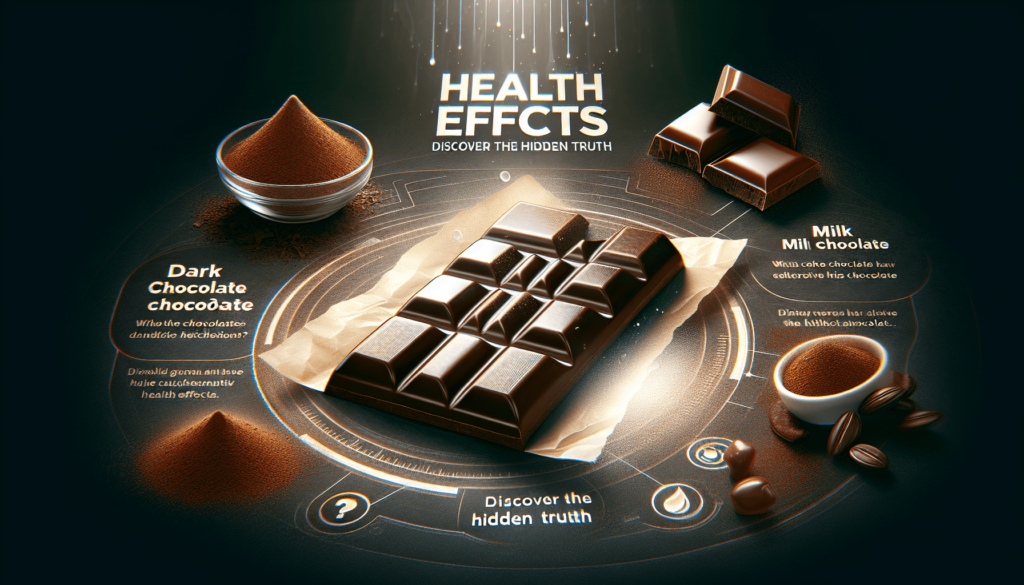Are you a chocolate lover looking to make healthier choices? The eternal question of which chocolate is worse for you has puzzled many. Dark chocolate is often touted as the “healthy” option, but is it always better than milk chocolate? In this article, we’ll shed light on the nutritional differences between the two and explore the factors that make one chocolate worse for you than the other. Get ready to indulge in some guilt-free chocolate knowledge!

Milk Chocolate vs Dark Chocolate
When it comes to indulging in chocolate, there are many options to choose from. Two of the most popular choices are milk chocolate and dark chocolate. These two variations not only differ in taste and texture, but also in their nutritional content and potential health benefits. In this article, we will explore the differences between milk chocolate and dark chocolate, as well as discuss their respective health benefits and risks. By understanding these factors, you can make an informed decision about which type of chocolate is best for you.
Cocoa Content
One of the key factors that differentiate milk chocolate from dark chocolate is the cocoa content. Cocoa is the main ingredient in chocolate and it plays a significant role in determining the flavor and health benefits of the final product. Dark chocolate generally contains a higher percentage of cocoa compared to milk chocolate. This higher cocoa content contributes to the rich, intense flavor of dark chocolate.
Sugar Content
Another important difference between milk chocolate and dark chocolate lies in their sugar content. Milk chocolate is typically sweeter and contains more sugar than dark chocolate. This sweetness contributes to its smooth and creamy texture, which many people enjoy. However, the higher sugar content in milk chocolate can have negative effects on your health, especially if consumed in excess.
Calorie Content
Calorie content is an important consideration when it comes to chocolate consumption, especially for those who are watching their weight or trying to maintain a healthy lifestyle. In general, dark chocolate tends to have a lower calorie content compared to milk chocolate. This is mainly due to the higher cocoa content in dark chocolate, which adds a rich flavor without adding excessive calories.
Fat Content
Fat content is another key difference between milk chocolate and dark chocolate. Milk chocolate typically contains more fat than dark chocolate, which contributes to its creamy texture and mouthfeel. However, not all fats are created equal. Dark chocolate contains a higher proportion of healthy fats, such as monounsaturated fats and polyunsaturated fats, that have been shown to have beneficial effects on heart health.
Health Benefits of Dark Chocolate
While both milk chocolate and dark chocolate can be enjoyed in moderation, dark chocolate has been found to offer more potential health benefits. These benefits are primarily attributed to the higher cocoa content and the presence of certain compounds in dark chocolate.
High in Antioxidants
Dark chocolate is rich in antioxidants, specifically flavonoids and polyphenols, which have been linked to various health benefits. Antioxidants help combat the harmful effects of free radicals in the body, reducing oxidative stress and inflammation. These compounds have been associated with a reduced risk of chronic diseases, such as heart disease and certain types of cancer.
Heart Health
Several studies have found a positive association between dark chocolate consumption and heart health. The flavonoids in dark chocolate have been shown to improve blood flow, reduce blood pressure, and decrease the risk of heart disease. Additionally, dark chocolate may help increase levels of “good” HDL cholesterol, while reducing levels of “bad” LDL cholesterol and triglycerides.
Improved Brain Function
The compounds found in dark chocolate may also have positive effects on brain function. The flavonoids in dark chocolate have been shown to improve cognitive function, enhance memory, and increase overall brain health. Additionally, dark chocolate contains small amounts of caffeine, which can provide a mild stimulant effect and improve focus and concentration.
Reduced Risk of Stroke
Consuming dark chocolate in moderation has been associated with a reduced risk of stroke. This is believed to be due to the antioxidant and anti-inflammatory properties of dark chocolate, as well as its ability to improve blood flow and reduce blood pressure. By incorporating dark chocolate into your diet, you may lower your risk of stroke and promote better overall cardiovascular health.
Health Risks of Milk Chocolate
While milk chocolate can be a delicious treat, it also comes with some health risks that should be considered.
High Sugar Content
One of the primary health risks associated with milk chocolate is its high sugar content. Excessive consumption of sugar can lead to weight gain, increased risk of chronic diseases such as diabetes and heart disease, and dental problems. It is important to be mindful of your sugar intake and consume milk chocolate in moderation, especially if you have a pre-existing medical condition or are at risk for certain health issues.
Increased Calorie Intake
Milk chocolate tends to be higher in calories compared to dark chocolate. Consuming excessive amounts of calories can lead to weight gain and an increased risk of obesity. If you are trying to manage your weight or maintain a healthy lifestyle, it may be beneficial to opt for dark chocolate, which has fewer calories per serving.
Lower Nutritional Value
In comparison to dark chocolate, milk chocolate generally has a lower nutritional value. Dark chocolate contains higher levels of beneficial minerals such as iron, magnesium, and copper, which play important roles in various bodily functions. However, milk chocolate is often processed with additives and additional ingredients, which can further reduce its nutritional content.
Potential Weight Gain
Due to its higher sugar and calorie content, regular consumption of milk chocolate can contribute to weight gain. Excess weight can increase the risk of numerous health conditions, including obesity, diabetes, and heart disease. Individuals with specific weight management goals should be cautious about their milk chocolate consumption and choose lighter alternatives whenever possible.
The Role of Cocoa
Cocoa, the main ingredient in chocolate, plays a crucial role in determining the health effects of different chocolate varieties. The processing and addition of ingredients can significantly impact the final product’s nutritional content and potential health benefits.
Cocoa’s Health Effects
Cocoa has been found to have several potential health benefits. It is rich in antioxidants, which can help reduce inflammation, protect against chronic diseases, and promote overall health. Additionally, cocoa contains various minerals and vitamins, including iron, magnesium, and B vitamins, which are essential for proper bodily functions.
Processing and Addition of Ingredients
The way cocoa is processed and the ingredients added to the chocolate can have a significant impact on its nutritional value. Dark chocolate is typically less processed and contains fewer additives compared to milk chocolate. This allows the natural compounds and nutrients present in cocoa to be retained to a greater extent. On the other hand, milk chocolate often contains additional ingredients such as milk powder, sugar, and other flavorings, which can decrease the overall health benefits of cocoa.

Sugar Content in Different Chocolates
excessive sugar consumption can have negative effects on your health, especially if consumed in large quantities over a prolonged period of time. It is important to be aware of the impact of sugar content in different chocolates on your overall health and wellbeing.
Impact of Excess Sugar
Consuming excessive amounts of sugar can lead to weight gain, increased risk of chronic diseases such as diabetes, heart disease, and tooth decay. It can also contribute to inflammation and oxidative stress in the body, increasing the risk of various health issues.
Comparison of Sugar Content
In general, milk chocolate contains a higher amount of sugar compared to dark chocolate. The sweetness of milk chocolate comes from the added sugar and the milk powder used in its production. Dark chocolate, on the other hand, typically contains less sugar, allowing the natural flavors of cocoa to shine through.
Effects on Blood Sugar Levels
Eating foods high in sugar, such as milk chocolate, can cause a rapid spike in blood sugar levels. This spike is followed by a sudden drop, which can leave you feeling fatigued and craving more sweets. Dark chocolate, with its lower sugar content, has a milder effect on blood sugar levels and can be a better option for those looking to maintain stable blood sugar levels.
Calorie Comparison
Calorie content is an important consideration for those who are mindful of their calorie intake or are trying to manage their weight. Let’s compare the calorie content of milk chocolate and dark chocolate.
Calories in Milk Chocolate
Milk chocolate tends to have a higher calorie content compared to dark chocolate. This is primarily due to its higher sugar and fat content. The creamy texture and richness of milk chocolate can be attributed to the added sugar and milk powder used during production, which contribute to a higher calorie count.
Calories in Dark Chocolate
Dark chocolate generally contains fewer calories than milk chocolate. The higher cocoa content in dark chocolate adds flavor without significantly increasing the calorie count. However, it is still important to consume dark chocolate in moderation, as excessive calorie intake can lead to weight gain and other health issues.
Weight Management
For individuals who are watching their weight or trying to maintain a healthy lifestyle, opting for dark chocolate can be a better choice. The lower calorie content in dark chocolate allows for indulgence without exceeding daily calorie limits. However, it is important to remember that portion control still plays a crucial role in overall weight management.
Fat Content Differences
The fat content in different types of chocolates can vary significantly and can have different effects on your health. Let’s delve into the differences in fat content between milk chocolate and dark chocolate.
Types of Fat in Chocolates
Both milk chocolate and dark chocolate contain fat, but the types of fat differ. Milk chocolate typically contains more saturated fat, which is considered less healthy when consumed in excess. Dark chocolate, on the other hand, contains a higher proportion of monounsaturated and polyunsaturated fats, which are considered healthier fats and can have positive effects on heart health.
Impact on Cholesterol Levels
Consuming excessive amounts of saturated fat, such as that found in milk chocolate, can increase levels of “bad” LDL cholesterol and have negative implications for heart health. On the contrary, dark chocolate’s higher content of monounsaturated and polyunsaturated fats can help increase levels of “good” HDL cholesterol and promote heart health when consumed in moderation.
Effects on Heart Health
The types of fats present in chocolate can have significant implications for heart health. Regular consumption of dark chocolate, with its higher content of healthy fats, may help improve heart health by reducing inflammation, preventing blood clots, and promoting better blood flow. In contrast, milk chocolate, with its higher saturated fat content, can have negative effects on cholesterol levels and overall heart health if consumed in large quantities.
Label Reading and Chocolates
Understanding the ingredients listed on chocolate labels is important for making informed choices and selecting healthier options.
Understanding Ingredients
When reading chocolate labels, it is important to pay attention to the ingredient list and understand what each ingredient represents. The first few ingredients listed typically make up the majority of the product. Try to choose chocolates with shorter ingredient lists and look for natural ingredients such as cocoa, cocoa butter, and natural sweeteners.
Hidden Ingredients and Additives
Some chocolates may contain hidden ingredients and additives that can have negative effects on your health. These can include artificial flavors, hydrogenated oils, and excessive amounts of sugar. Avoiding chocolates with these additives and opting for more natural alternatives can help you make healthier choices.
Choosing Healthier Options
To choose healthier chocolates, consider opting for dark chocolate with a higher cocoa content and fewer added ingredients. Look for chocolates labeled as “dark” or “bittersweet” with a cocoa percentage of 70% or higher. These options will have higher levels of beneficial cocoa compounds and a lower sugar content compared to milk chocolate.
Moderation and Portion Control
When it comes to chocolate consumption, moderation and portion control are key for maintaining a healthy balance between indulgence and overall wellbeing.
Importance of Moderation
While dark chocolate has its health benefits, consuming excessive amounts can still lead to weight gain and other health issues. It is crucial to practice moderation and enjoy chocolate as part of a balanced diet. A small indulgence can be satisfying without compromising your health goals.
Recommended Daily Allowance
The recommended daily allowance for chocolate consumption varies based on individual needs and goals. However, health experts suggest limiting chocolate intake to a small portion, such as one or two squares of dark chocolate per day. By practicing portion control, you can still enjoy the taste and benefits of chocolate without overdoing it.
Enjoying Chocolate Responsibly
Responsible chocolate consumption involves being aware of your intake and making mindful choices. Allow yourself to savor the flavors and experience the joy that chocolate brings, but always keep your health goals and overall wellbeing in mind. Remember, moderation is key.
Conclusion
When it comes to choosing between milk chocolate and dark chocolate, it’s important to consider both personal preferences and health goals. While milk chocolate may be sweeter and have a creamier texture, dark chocolate offers more potential health benefits due to its higher cocoa content. Dark chocolate is rich in antioxidants, promotes heart health, improves brain function, and reduces the risk of stroke. However, it is still essential to consume any type of chocolate in moderation and exercise portion control to maintain a healthy balance. By understanding the differences between milk chocolate and dark chocolate, as well as their respective health benefits and risks, you can make an informed decision that aligns with your personal preferences and health goals. So go ahead and enjoy the wonderful world of chocolate, but remember to indulge responsibly!





